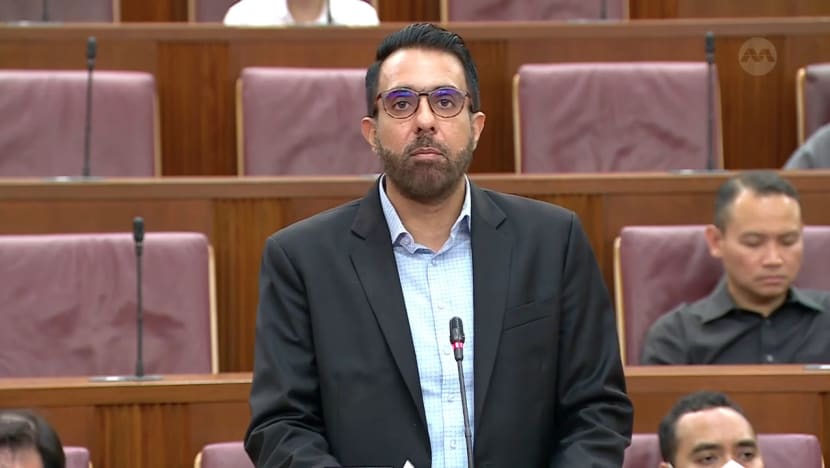GST hike was a 'poor' decision that 'turbocharged' inflation: Pritam Singh
The Leader of the Opposition and Workers’ Party chief also criticised the government for "poor fiscal marksmanship" in balancing Singapore's expenditure needs with revenue.

Leader of the Opposition Pritam Singh speaking in parliament during the Budget debate on Feb 26, 2025.

This audio is generated by an AI tool.
SINGAPORE: Leader of the Opposition and Workers’ Party (WP) chief Pritam Singh on Wednesday (Feb 26) criticised the government on a number of issues including its decision to proceed with the GST hike amid inflationary pressures.
He also took aim at what he described as the government's "poor fiscal marksmanship" in forecasting Singapore's financial needs.
Speaking on the first day of the Budget debate in parliament, Mr Singh questioned the necessity of raising the Goods and Services Tax in 2023 and 2024, given the country's "exceedingly healthy" fiscal position.
Noting the government's projected fiscal surplus of S$6.8 billion (US$5.08 billion) for the financial year 2025, Mr Singh pointed out that 2024's fiscal surplus, which was originally estimated at S$778 million, was "revised massively" upwards to S$6.4 billion.
Mr Singh also pointed out that the government had estimated it would see deficits in FY2022 and FY2021, but these turned out to be surpluses instead.
Last week, it was announced that the government collected more revenue than anticipated in financial year 2024, with operating revenue rising to S$116.6 billion, an increase of S$8 billion or 7.3 per cent more than estimated.
Total government expenditure increased by 1 per cent or S$1.2 billion to S$112.9 billion, driven in part by public housing needs and defence spending.
The government spent less than expected on healthcare as there were reduced requirements related to COVID-19, and a lower-than-expected take-up rate for community care salary enhancement schemes.
"Even as imported inflation contributes to price rises locally, there was no need for the PAP (People's Action Party) government to add fuel to the fire and fan the flames of inflation further with the GST hike," said Mr Singh.
"Even if the decision was made to raise it in 2023, there was ample policy space to delay the second increase in 2024 when the country was in the thick of inflation.
"Why the PAP went headlong and headstrong into raising GST and thereby turbocharging inflation further, is something only the PAP itself can answer to Singaporeans for."
In his speech, Mr Singh added that the government has shown "poor fiscal marksmanship" in trying to match Singapore's expenditure needs with revenue.
"Singaporeans would not be out of place to ask why is there a need to collect so much money when the government's fiscal projections are so unpredictable, but somehow always so healthy when elections have to be called," he said.
"While I am sure the fiscal headroom is politically attractive and even desired by the PAP at the end of the term notwithstanding its constitutional obligations, it should not underestimate the correlation between this poor marksmanship and potential public cynicism in (the) future when taxes must be increased for legitimate reasons."
Mr Singh reiterated his call for an independent parliamentary budget office, a proposal he had previously raised during the 2021 Budget debate.
"This was roundly rejected by the former finance minister (Heng Swee Keat), and with the leader of the House (Indranee Rajah) positing that it would only benefit the opposition," said Mr Singh.
"My colleagues and I beg to differ, and perhaps in light of unpredictable projections, such an institution would also benefit the government."
"NO GST OFFSET PACKAGE LASTS FOREVER"
Last week, Prime Minister and Finance Minister Lawrence Wong announced what he called "a Budget for all Singaporeans".
Community Development Council (CDC) vouchers and rebates on utilities were increased and further topped up with SG60 credits and handouts in celebration of Singapore's 60th year of independence.
Large families with three or more children will get additional support to cushion the impact of rising costs. Other support measures for businesses, hawkers and workers were also announced.
However, Mr Singh said the vouchers handed out would provide only temporary relief as broader cost-of-living issues persist.
"Life is very tough for the Singapore that is in the heartland. Concerns over jobs, prices, housing costs and opportunities continue for many Singaporeans and their households," he said.
"The numerous vouchers will give us help for a little while, but not for long. After all, no GST offset package lasts forever."
The decision to proceed with the GST hike with "inflation raging" was a "poor" one, he added.
The GST rate currently stands at 9 per cent, following a two-step increase from 7 to 8 per cent in 2023, and from 8 to 9 per cent in 2024.
"We have seen assurance packages and CDC vouchers dished out to cushion the GST blow for many Singaporeans, but when these handouts stop, as they eventually will, the 9 per cent GST will remain until any subsequent increase the PAP government sees fit to impose," said Mr Singh.
Mr Singh noted that at the 2021 Budget, S$100 worth of CDC vouchers were given out to every Singaporean household and that amount has now increased to S$800.
"Beyond the S$800 CDC vouchers and S$800 SG60 vouchers, more than a few political watchers noticed PAP MPs thumping their armrests in unison when the finance minister announced that climate vouchers worth S$400 were being extended to private household dwellers too, a relatively small and generally more well-off segment comprising of about 15 per cent of our population," he added.
"Reflecting on the cost of living crisis, this enthusiastic gesture was both telling and ironic."
The WP has consistently opposed the GST hike since it was first announced in Budget 2018, pointing to a lack of clarity on long-term projected government income and spending.
Three years ago, the party also opposed Budget 2022, where the decision to raise the GST was finalised. During that debate, the WP proposed several alternative revenue measures.
"SOFT UNDERBELLY OF SOCIETY"
Beyond fiscal concerns, Mr Singh spoke about broader socio-economic issues, including Singapore's population growth surpassing 6 million and the fertility rate dropping below 1.0.
"With finite land, other Singaporeans question, in the interest of their children, how many more does the government seek to squeeze in? And what cans are we kicking down the road for future generations of Singaporeans who will live in a far denser city than today?"
Given a growing population and a manpower shortage in areas, it is "inevitable" that more "basic manpower" needs could be filled by foreigners and result in competition with locals, said Mr Singh.
While the government is aware of the importance of unity and integrating foreigners into Singapore society, this issue continues to be a "soft underbelly" of society with faultlines that can be "easily exploited", he added.
Said Mr Singh: "Integration and a sense of rootedness will continue to be a major issue in Singapore in the years to come, and no amount of vouchers can make people feel rooted to Singapore."


















